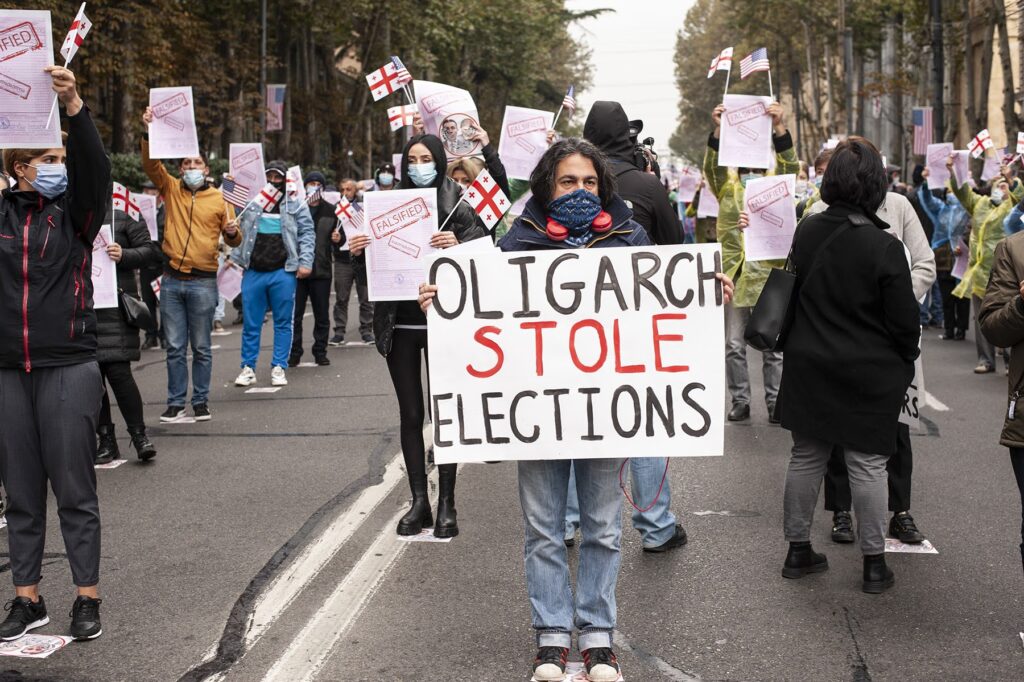Georgia’s largest opposition party, the United National Movement (UNM), has put forward an anti-oligarchy law to counter a draft submitted by the ruling Georgian Dream party.
The UNM submitted their draft to parliament on Sunday.
Opposition factions have grown increasingly concerned that the Georgian Dream-sponsored bill currently being discussed in parliament could affect opposition parties while bypassing Bidzina Ivanishvili — the billionaire founder of the ruling party.
In its draft law, the UNM laid out six criteria for an oligarch, with anyone who meets at least three of them considered to be an oligarch.
The six criteria:
- Someone who carries out political activities ‘directly or indirectly’.
- Someone whose family members hold state or political positions.
- Someone who ‘directly or indirectly … exerts a significant influence’ on the media.
- Someone who owns a company in a sector subject to natural monopolies or one which holds a dominant position in their sector, as defined by the current competition legislation.
- Someone whose assets exceed 0.35% of Georgia’s GDP (around $65 million) or whose family owns more than 7% of Georgia’s land.
- Someone subject to sanctions from any NATO or EU country or institution.
On 9 June, the European Parliament called on the EU to consider adopting sanctions against Ivanishvili due to the deteriorating state of media freedom in Georgia.
[Read more on OC Media: European Parliament calls for sanctions to be considered on Ivanishvili]
According to the UNM’s draft law, labelling a person an oligarch would require the approval of just 1/5th of the parliament but would then also have to be ratified by the Constitutional Court.
In contrast, Georgian Dream’s draft law would grant the prerogative of labeling a person an oligarch to parliament alone, requiring a majority vote to add a person and their relatives to the oligarch register.
UNM MP Levan Bezhashvili said his party’s draft law ‘does not apply to any specific person’ but serves to ‘prevent oligarchical rule in the future’.
Georgian Dream’s pledge to de-olirgarchise
Georgian Dream’s anti-oligarchy law passed its second reading in parliament on 16 November with a final vote likely to take place by the end of the year.
The ruling party has claimed that it based its draft law on Ukraine’s de-oligarchisation law; it defines an oligarch based on their wealth, political and media influence, and being the beneficiary of a monopolistic business.
Additionally, the draft law defines an oligarch as an individual whose assets are a million times higher than a Georgian’s average monthly income: ₾254 million ($93 million) based on 2022 data indicating that the average monthly income in Georgia is ₾254 ($93).
[Read on OC Media: Georgian Dream's ‘anti-oligarchy law’ set to bypass Ivanishvili and target his rivals]
By far the biggest point of contention in the ruling party’s anti-oligarchy draft is that it likely would not apply to Bidzina Ivanishvili, who formally left politics in January 2021.
The chair of Georgian Dream, Irakli Kobakhidze, has previously stressed that Ivanishvili was not an oligarch, and that his party’s draft law specifically targetted individuals such as former President Mikheil Saakashvili and former Defence Minister Davit Kezerashvili.
Georgia’s prospect of attaining EU candidate status is contingent on fulfilling 12 requirements, after the country failed to secure candidacy in June. A number of MEPs have made clear the requirement to pass de-oligharchisation legislation was explicitly in reference to Ivanishvili.




 21 November 2022
21 November 2022



